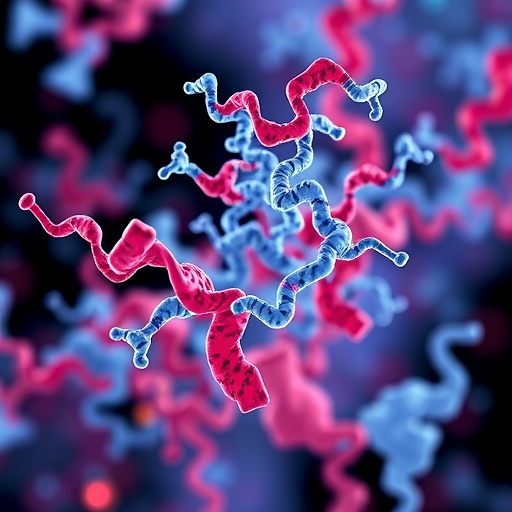Recent advancements in biotechnology and artificial intelligence have led to significant breakthroughs in drug development, particularly in the realm of anticancer therapeutics. Among these advancements, the research conducted by Lv, Li, and Wang introduces a novel framework named ACP-EPC, which effectively leverages a pre-trained protein language model alongside a multi-view feature extracting strategy. This unprecedented approach aims to enhance the predictive accuracy for anticancer peptide sequences, offering profound implications for the future of oncological treatments.
In the field of pharmacology, peptides have emerged as promising candidates for drug development due to their high specificity and lower side effects compared to traditional small molecule drugs. However, the identification and optimization of potential anticancer peptides remain challenging tasks due to the complexities associated with their biological activity and the vast sequence space of peptides. Traditional methods of peptide discovery, often slow and resource-intensive, do not suffice in meeting the urgent demands of modern medicine.
The ACP-EPC framework is an innovative solution designed to address these challenges through an interpretable deep learning model. This model utilizes a protein language model that has been pre-trained on vast datasets, effectively capturing significant features and patterns within protein sequences. By integrating this state-of-the-art technology, researchers can streamline the peptide discovery process and significantly reduce the time it takes to identify promising anticancer candidates.
One of the key strengths of the ACP-EPC framework lies in its interpretability. In contrast to many black-box models that dominate the deep learning landscape, ACP-EPC provides clarity on how specific peptide features contribute to the overall predictive outcomes. This transparency is essential, particularly in the biomedical field, where understanding the underlying mechanisms of action can guide further experimental validation and real-world application of predicted peptides.
The multi-view feature extraction strategy incorporated into ACP-EPC adds another layer of sophistication to the predictive modeling process. By collating data from multiple perspectives, researchers can better understand the diverse characteristics of peptide sequences, including their physicochemical properties, structural features, and biological functions. This comprehensive approach enhances the model’s ability to discern complex interactions that may not be apparent when only considering a single data perspective.
Moreover, the model has been validated against several existing datasets, demonstrating high accuracy in predicting anticancer peptides compared to traditional methods. This validation process is crucial because it establishes the reliability of the model and its potential application in real-world scenarios, including the rapid synthesis and testing of peptides in clinical settings.
The implications of this research are monumental, particularly at a time when the global healthcare landscape is heavily scrutinizing the efficiency of drug development processes. Typical drug discovery can span over a decade and involves significant financial investment; thus, the ability to quickly and accurately predict effective anticancer peptides could not only hasten the pace of research but also yield cost-effective solutions in oncology.
As the pharmaceutical industry continues to grapple with the challenges posed by chemotherapy resistance and the need for personalized medicine, the relevance of such frameworks becomes even more pronounced. The ACP-EPC framework shines a beacon of hope of developing targeted therapies that are tailored to individual patient profiles, ultimately leading to improved treatment outcomes and higher survival rates in cancer patients.
Another noteworthy aspect of the study is the potential for collaboration across disciplines. By integrating insights from computational biology, machine learning, and pharmacology, researchers can gain a holistic understanding of peptide interactions within biological systems. This interdisciplinary approach is essential, as it encourages innovation and promotes the exchange of ideas, ultimately leading to further advancements in therapeutic modalities.
In summary, the ACP-EPC framework presents a revolutionary approach to anticancer peptide prediction, combining cutting-edge artificial intelligence with deep insights drawn from biological data. This research not only paves the way for more effective drug discovery but also represents a shift towards more integrated, interdisciplinary frameworks in biotechnology. As researchers continue to explore the depths of machine learning in drug design, the potential for improved patient outcomes continues to grow, and the future of cancer treatment looks increasingly promising.
As this study is published in a reputed journal, it also highlights the ongoing shift in the academic community towards prioritizing transparency and reproducibility in research. By providing interpretable models and openly sharing methodologies, scientists foster a culture of openness that promotes further inquiry and exploration into new therapeutic avenues. The ACP-EPC framework exemplifies this ethos and serves as a model for future research endeavors in the continuously evolving landscape of cancer therapeutics and artificial intelligence.
In conclusion, the research led by Lv and colleagues is set to impact the field significantly and could potentially set new standards for how we think about and approach anticancer drug development. Innovators and researchers alike are urged to take note of this framework, as it might very well be the key to unlocking new horizons in the fight against cancer.
As scientific inquiry continues to intersect with technological advancements, frameworks like ACP-EPC signal a future where computational predictions and biological experiments go hand-in-hand, fostering a new age of personalized medicine. The collaborative future of science holds promise not only for researchers but also for patients who stand to benefit from more effective therapies designed from a deeper understanding of their biological makeup.
Subject of Research: Anticancer Peptide Prediction Using Deep Learning
Article Title: ACP-EPC: an interpretable deep learning framework for anticancer peptide prediction utilizing pre-trained protein language model and multi-view feature extracting strategy.
Article References:
Lv, J., Li, K., Wang, Y. et al. ACP-EPC: an interpretable deep learning framework for anticancer peptide prediction utilizing pre-trained protein language model and multi-view feature extracting strategy. Mol Divers (2025). https://doi.org/10.1007/s11030-025-11352-x
Image Credits: AI Generated
DOI:
Keywords: Anticancer peptides, deep learning, protein language model, multi-view feature extraction, drug discovery.




